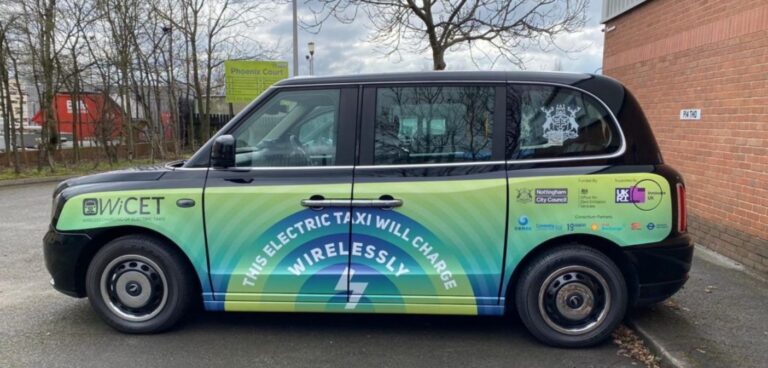Nottingham will see nine electric taxis adorned in a new green and blue livery as part of a wireless charging EV trial funded by the UK Office for Zero Emission Vehicles (OZEV).
Five plug-in hybrid LEVC TX taxis and four all-electric Nissan Dynamo taxis will promote the WiCET (Wireless Charging of Electric Taxis) branding, with “This electric taxi will charge wirelessly” emblazoned over concentric rings that signify the wireless power transfer.
The taxis will be available on Nottingham’s streets for hail by the general public as they capture vehicle data for the trial, including journey distances and battery level. As previously reported by CiTTi, posters inside the taxis will help inform passengers how wireless charging works and the benefits of charging wirelessly.
The first two WiCET electric taxis were fitted with wireless charging technology from Sprint Power earlier this summer, and the remaining vehicles will be wirelessly enabled at the beginning of next year.
Wireless EV charging occurs when a compatible vehicle is stationary over a wireless induction pad that can be built into the road surface to top-up battery power. The technology is designed to offer a convenient alternative to conventional plug-in chargepoints without the need for cables.
According to those involved in the project, wireless EV charging will help provide better service availability for passengers and allow more time collecting fares for taxi drivers. Furthermore, its believed that charging wirelessly through short bursts will also help reduce range anxiety and optimise battery usage.
The livery will be on the taxis for the duration of the trial, which is due to complete by March 2022.
Councillor Sally Longford, portfolio holder for energy and environment at Nottingham City Council, said: “It’s exciting to see the vehicles with their new, eye-catching livery.
“While we’re proud that Nottingham’s taxi fleet already boasts a large number of electric taxis, wireless charging is the next step to make them even more convenient and easier for drivers to use – and no need for cables on our taxi ranks.
“Making our taxis cleaner will help to improve air quality in the city, and help us reach our goal of becoming the UK’s first carbon neutral city by 2028. I’m looking forward to seeing this new technology trialled on our streets.”
Some £3.4m in funding for the wireless taxi charging project has been awarded by Innovate UK. Consortium partners include CENEX (Centre of Excellence for Low Carbon and Fuel Cell Technologies), Coventry University, Nottingham City Council, Shell, Parking Energy, Sprint Power and Transport for London.



